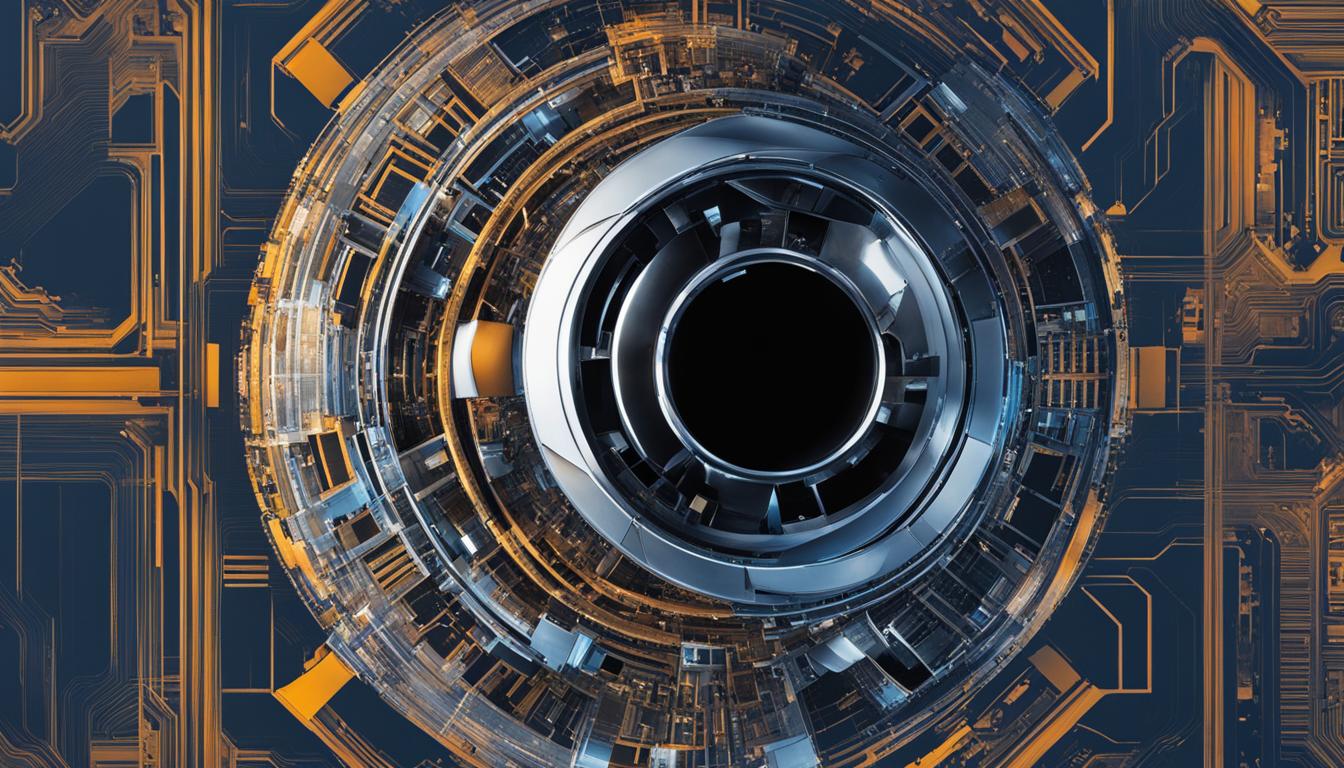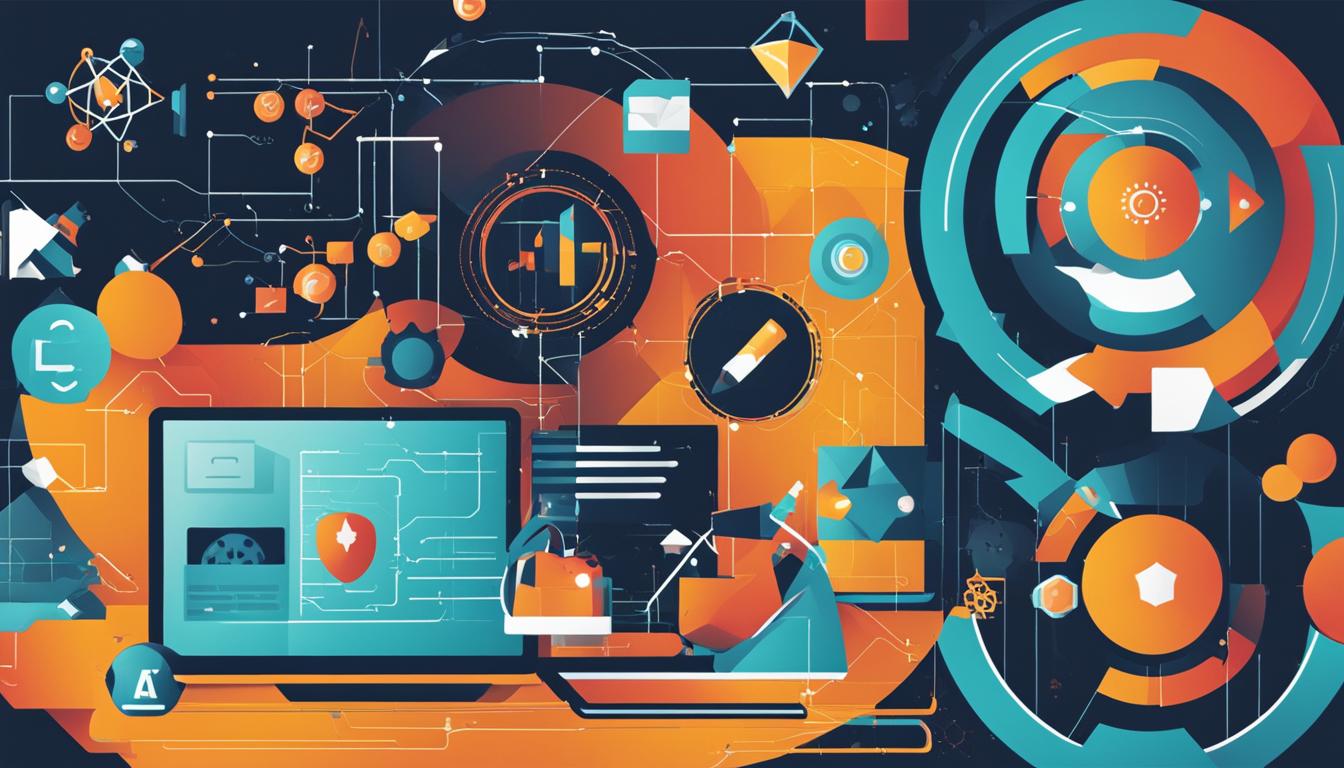Artificial intelligence (AI) and AI ethics are two related but distinct concepts that shape the digital world. While AI refers to the technology and systems that enable machines to perform tasks that would typically require human intelligence, AI ethics focuses on the moral principles and responsible use of AI. Understanding the difference between these two concepts is crucial for addressing the ethical implications of AI and promoting its responsible development and deployment.
Key Takeaways:
- Artificial intelligence (AI) refers to the technology and systems that enable machines to perform tasks that require human intelligence.
- AI ethics focuses on the moral principles and responsible use of AI.
- Understanding the difference between AI and AI ethics is crucial for addressing the ethical implications of AI.
- Promoting responsible development and deployment of AI is essential for its ethical use.
- AI ethics helps establish guidelines for the responsible development and use of AI.
The Problem with “Trustworthy AI”
The term “trustworthy AI” is problematic because it implies a level of dependability that AI does not possess. Unlike humans, AI does not work all the time, and asking users to trust it can be misleading. AI should be seen as a product of engineering rather than a mysterious alchemy that requires trust.
AI systems are designed to perform specific tasks based on predefined algorithms and data inputs. They lack the cognitive abilities and contextual understanding that humans possess, making their decision-making processes different from human reasoning. While AI has shown tremendous advancements in areas like machine learning and natural language processing, it is still limited in its overall capabilities.
When users rely on AI systems, they should understand the limitations and potential pitfalls associated with them. Engineering principles that focus on rigorous testing, reliability, and error detection should guide the development and use of AI systems. Trust in AI should be built through transparency, explainability, and a clear understanding of its boundaries.
| Human Abilities | Computational Abilities | |
|---|---|---|
| Contextual Understanding | Humans can understand and interpret complex contexts. | AI systems lack contextual understanding, relying on data patterns and algorithms. |
| Intuition | Humans can make intuitive decisions based on experience and emotional intelligence. | AI systems do not possess intuition and make decisions solely based on data. |
| Flexibility | Humans can adapt and learn new skills quickly. | AI systems require retraining or reprogramming to learn new tasks or adapt to changes. |
| Moral Reasoning | Humans have moral agency and can make ethical judgments. | AI systems lack moral agency and rely on human-defined ethical guidelines. |
The Problem with “Ethical AI”
The concept of “Ethical AI” has gained significant attention in recent years, as society grapples with the moral implications of artificial intelligence. However, it is important to recognize that AI itself does not possess moral agency or the ability to make value judgments like humans. Instead, AI is a tool created by humans, and the ethical responsibility lies with the individuals who design and develop AI systems.
While the term “Ethical AI” may suggest that AI has the capacity to act ethically, it is essential to understand that AI operates based on algorithms and instructions provided by humans. These algorithms are driven by data and mathematical models, rather than moral reasoning or intent. Therefore, the ethical responsibility lies not with the AI itself, but with the decisions made by its human creators.
When discussing the ethical implications of AI, it is crucial to emphasize the role of human intention and responsibility in AI systems. Ethical considerations should be integrated into the development and deployment of AI technologies, ensuring that they are used in a manner that aligns with societal values and norms. This responsibility extends to addressing issues such as bias, fairness, and transparency in AI decision-making processes.
Responsible AI
Responsible AI is a critical concept that emphasizes the responsible development and use of AI technologies. It recognizes that while AI itself does not possess responsibility, humans have a duty to ensure its ethical and responsible implementation. Collaboration between philosophers, developers, and designers plays a crucial role in identifying and addressing ethical risks associated with AI systems and products.
By working together, these stakeholders can establish guidelines and frameworks that promote responsible AI innovation. They can design AI systems that align with ethical principles, taking into account the potential impact on individuals and society as a whole. Responsible AI development involves considering the fairness, transparency, and accountability of AI systems, ensuring that they are designed and deployed in a way that upholds ethical standards.
Benefits of Responsible AI
Adopting responsible AI practices offers numerous benefits. Firstly, it instills trust among users and stakeholders, as they can be confident that AI technologies are being used ethically and responsibly. This trust contributes to the overall acceptance and adoption of AI solutions, facilitating their integration into various industries.
Furthermore, responsible AI promotes innovation and the development of AI systems that have a positive impact on society. By addressing potential biases and risks associated with AI, organizations can build AI solutions that are fair, unbiased, and transparent. This leads to better decision-making processes and outcomes, fostering a more inclusive and equitable digital world.
| Responsible AI | Irresponsible AI | |
|---|---|---|
| Development and Use | Promotes ethical development and use | May lead to unethical consequences |
| Collaboration | Involves collaboration between stakeholders | Lack of collaboration and oversight |
| Trust and Acceptance | Builds trust and acceptance among users | May lead to mistrust and resistance |
| Impact on Society | Has a positive impact on society | Potential negative effects on society |
Responsible AI practices also help organizations attract and retain top talent. Employees are increasingly drawn to companies that demonstrate a commitment to ethical practices and responsible use of AI. By prioritizing responsible AI, organizations can create a positive work environment that aligns with the expectations and values of employees.
In conclusion, responsible AI is crucial for ensuring the ethical development and use of AI technologies. By collaborating with stakeholders, organizations can mitigate ethical risks, build trust, and contribute to a more responsible and inclusive digital world.
Ethical Challenges of AI
As artificial intelligence (AI) continues to advance and infiltrate various industries, it brings along a range of ethical challenges that need to be addressed. These challenges revolve around explainability, responsibility, fairness, and the potential misuse of AI.
Explainability
One of the primary ethical challenges of AI is the lack of explainability. AI systems often make complex decisions based on algorithms and deep learning, which can be difficult to understand and trace. This lack of transparency raises concerns about accountability and the ability to identify biases or errors in AI-based decision-making.
Responsibility
Another significant challenge is determining who is responsible for the decisions made by AI systems. As AI becomes more autonomous and capable of making decisions on its own, it becomes crucial to establish clear lines of responsibility. This includes understanding the extent to which developers, designers, and users are accountable for the actions and outcomes of AI systems.
Fairness
Ensuring fairness in AI systems is another ethical challenge. AI technology relies on vast amounts of data, and if that data is biased or flawed, it can lead to unfair outcomes. Addressing biases and ensuring equitable representation within AI systems is essential to prevent discrimination and promote fairness in decision-making.
Misuse
Lastly, the potential misuse of AI poses a significant ethical challenge. AI can be harnessed for malicious purposes, such as spreading disinformation, invading privacy, or perpetuating harmful stereotypes. Protecting against such misuse requires careful consideration of ethical guidelines, regulations, and responsible use of AI technology.
| Ethical Challenges of AI | Description |
|---|---|
| Explainability | Lack of transparency in understanding and tracing AI-based decision-making. |
| Responsibility | Determining accountability for decisions made by AI systems. |
| Fairness | Addressing biases and ensuring equitable outcomes in AI systems. |
| Misuse | Preventing malicious use of AI technology for harmful purposes. |

Overall, addressing these ethical challenges is crucial for the responsible development and use of AI. By prioritizing explainability, responsibility, fairness, and preventing misuse, we can ensure that AI technology benefits society and upholds ethical values.
Importance of AI Ethics
AI ethics plays a crucial role in ensuring the responsible use of AI and mitigating potential risks. One of the key risks associated with AI is the use of faulty or biased data. If AI systems are trained on inaccurate or discriminatory data, the outcomes can be detrimental to individuals and society as a whole. By prioritizing AI ethics, organizations can minimize these risks and ensure that AI technologies are developed and deployed in a transparent and accountable manner.
Transparency in AI decision-making is another significant aspect of AI ethics. As AI systems become more integrated into various domains of society, it is essential to understand how decisions are being made. By promoting transparency, organizations can build trust and empower individuals to evaluate and question AI-based decisions. This transparency also enables the identification and mitigation of biases or unintended consequences that may arise from AI algorithms.
To illustrate the importance of AI ethics, consider the example of an AI-powered hiring tool. If this tool is built on biased data or algorithms, it may perpetuate discrimination or favor certain demographics over others. This can have significant implications for individuals seeking employment opportunities. By incorporating ethical principles into the design and use of AI, organizations can ensure fairness and equal opportunities in hiring processes.
Ultimately, the responsible use of AI is crucial for creating a more ethical and inclusive digital world. By embracing AI ethics, organizations can navigate the potential pitfalls of AI technology, promote transparency and accountability, and contribute to positive societal impact.
Benefits of Ethical AI
Ethical AI offers numerous advantages, making it a valuable approach for businesses and society as a whole. By prioritizing ethical considerations in AI development and deployment, organizations can achieve customer-centricity, drive positive impact, retain top talent, and ensure responsible use of AI.
Customer-Centricity
One of the key benefits of ethical AI is its ability to contribute to customer-centricity. By designing AI systems with ethical guidelines in mind, businesses can ensure that their AI tools prioritize the needs and preferences of customers. This customer-centric approach helps build trust, enhance user experiences, and foster long-term customer loyalty.
Positive Impact
Ethical AI also enables organizations to have a positive impact on society. By considering ethical implications throughout the AI development process, businesses can proactively identify and mitigate potential harms. This responsible use of AI helps prevent biases, discrimination, and other negative consequences, ensuring that AI technologies contribute to the greater good.
Retaining Talent
In today’s competitive job market, attracting and retaining top talent is crucial for organizations. By embracing ethical AI practices, businesses demonstrate their commitment to responsible technology use. This ethical stance not only appeals to ethical-minded professionals but also helps create a positive work environment that values social responsibility. As a result, organizations can attract and retain talented employees who align with their ethical principles.
| Benefits of Ethical AI |
|---|
| Customer-Centricity |
| Positive Impact |
| Retaining Talent |
Responsible Use of AI
Lastly, ethical AI promotes responsible use of AI technologies. By adhering to ethical guidelines and principles, organizations can ensure that AI is deployed in a manner that respects privacy, fosters transparency, and upholds societal values. This responsible approach minimizes the risk of AI misuse and safeguards against unintended negative consequences.
Overall, the benefits of ethical AI are far-reaching. It helps organizations prioritize customer needs, drive positive societal impact, attract and retain talent, and promote responsible use of AI. By embracing ethical AI practices, businesses can position themselves as leaders in ethical technology development and contribute to a more inclusive and responsible digital world.

Conclusion
In conclusion, understanding the difference between artificial intelligence (AI) and AI ethics is crucial for navigating the ethical implications and responsible use of AI. AI refers to the technology itself, enabling machines to perform tasks that would typically require human intelligence. On the other hand, AI ethics focuses on the moral principles and responsible development and deployment of AI.
By adopting responsible AI practices, organizations can mitigate risks, promote trust, and contribute to a more ethical and inclusive digital world. Responsible AI involves collaboration between philosophers, developers, and designers to identify and mitigate ethical risks associated with AI systems and products. It also acknowledges that responsibility lies with humans and the intent behind AI is determined by human decisions.
Overall, AI ethics is essential for promoting the responsible use of AI tools and mitigating potential harms. An AI ethics framework helps highlight the risks and benefits of AI and establishes guidelines for its responsible development and use. By prioritizing responsible AI, businesses can contribute to customer-centricity, positive societal impact, and retain talent, while aligning with societal expectations and promoting transparency in AI decision-making.
FAQ
What is the difference between artificial intelligence and AI ethics?
Artificial intelligence refers to the technology and systems that enable machines to perform tasks requiring human intelligence. AI ethics, on the other hand, focuses on the moral principles and responsible use of AI.
Why is the term “trustworthy AI” problematic?
The term “trustworthy AI” can be misleading as it implies a level of dependability that AI does not possess. Unlike humans, AI does not work all the time, and asking users to trust it can be misleading.
What is the problem with “ethical AI”?
“Ethical AI” suggests that AI has moral agency and the ability to make value judgments like humans. However, AI is not an ethical being with intent; it is a tool created by humans. The ethical responsibility lies with the people who design and develop AI systems.
What does “responsible AI” mean?
“Responsible AI” emphasizes the importance of responsible development and use of AI. It acknowledges that responsibility is a human trait extended to institutions. Responsible AI involves creating structures and roles for developing AI ethically.
What are the ethical challenges of AI?
Ethical challenges of AI include the need for explainability, responsibility, fairness in AI decision-making, and potential misuse of AI for unintended purposes.
Why is AI ethics important?
AI ethics is crucial for promoting the responsible use of AI tools and mitigating potential harms. Poorly designed projects built on faulty or biased data can have unintended consequences. The lack of transparency in AI decision-making also raises concerns.
What are the benefits of ethical AI?
Ethical use of AI contributes to customer-centricity in businesses and ensures a positive impact on society. It helps build trust with consumers and employees, leading to customer loyalty and talent retention. Responsible AI use aligns with societal expectations, promoting smooth operations and positive brand perception.
What is the importance of understanding the difference between artificial intelligence and AI ethics?
Understanding the difference between artificial intelligence and AI ethics is essential for navigating the ethical implications and responsible use of AI. By adopting responsible AI practices, organizations can mitigate risks, promote trust, and contribute to a more ethical and inclusive digital world.
 Skip to main content
Skip to main content


